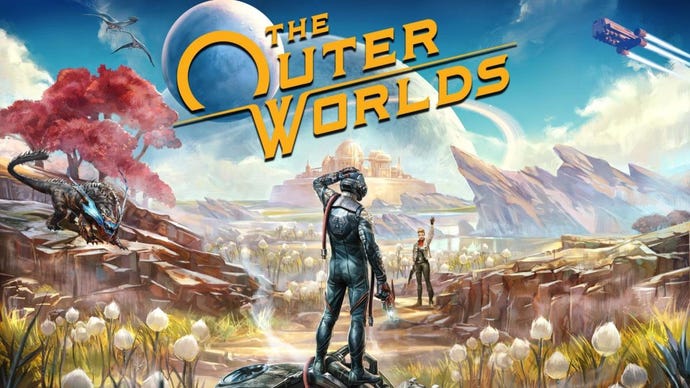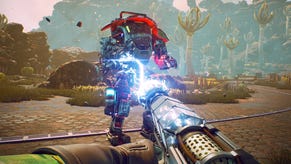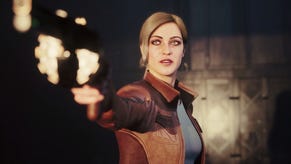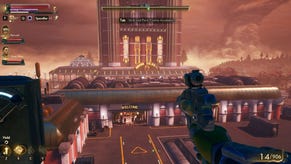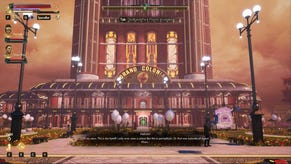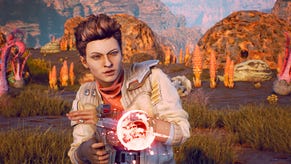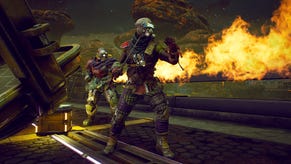The Outer Worlds proves that RPGs and comedy can mix
Vicar Max is the very best chair in your house - high backed, covered in velvet, poised and ready to take any weight you lay in his lap. As Edgewater’s spiritual counsel, he helps the local workers remember the nobility of being a cog in a corporate enterprise - for without the gear, what use is the machine?
“They who are not satisfied with their work are satisfied with nothing,” he preaches. “Work fortifies the spirit. True exhaustion awaits idle hands.” And then, suddenly: “What the f**k is this? French?”
He brandishes in his hands the book he’s sent you to recover, which might just hold the secrets to understanding the order of the universe and our place within it - were it not for one problem: “I can’t f**king read French.”
The good vicar’s transformation, from reassuring presence to figure of sweary exasperation, is one of The Outer Worlds’ best punchlines. But it’s far from the only one. From the start, Obsidian indicated that its Fallout: New Vegas follow-up would be funny.
The announcement trailer was punctuated not by explosions, but jokes. It began with the charming and alarming Doc Brown-isms of mad scientist Phineas Welles (“Are you feeling anything that could be construed as… explosive cell death?”), and climaxed with an inspired spoof of the RPG genre’s tendency towards big choices. When the player chooses to solve an argument by shooting one party dead, the surrounding NPCs react with stunned disbelief - hands clasped to mouths, eyes bulging. “You know you didn’t have to shoot either one, right?”
The moment provided easily the biggest laugh of last year’s Game Awards, and reflects the strain of dark humour that flows through the finished game. It might be less pronounced than in the trailer, which benefits from a taut runtime and the comedy of custom animations, but it’s always there - distinguishing The Outer Worlds as both a smart satire and platform for one-off gags.
How often does that happen? The last out-and-out comedy RPG from a triple-A studio was Fable 3, almost a decade ago. And yet it’s evident how effective they can be - Fable isn’t quoted for its celebrity-voiced plot dramatics, but for the villagers who call you “arseface”. In fact, “arseface” has outlasted dozens of earnest fantasy legends since.
There’s a good reason BioWare’s writing rooms don’t resemble Saturday Night Live, though. The biggest challenge in RPG narrative isn’t writing clever companions or heartbreaking endings. It’s consistency. You often used to hear RPG studios brag about their absurd word counts - 740,000 for Dragon Age: Origins, 950,000 for Planescape: Torment, over a million for Baldur’s Gate 2 - and that quantity is only made possible by good delegation.
Obsidian’s process, at least at the time Chris Avellone worked there, began with a product director and creative lead sketching out the horizon of a plot. But to fill in the detail, they put a number of other writers in charge of individual areas, quests, and companions. “The most important thing is that whatever they do is consistent,” Avellone once told me.
From there, the biggest struggle is tone. Even as individual writers weave away at their own corners of the tapestry, they have to regularly step back and check they’re not stitching a man’s head onto a horse’s ass, metaphorically speaking. These concerns are the subject of bi-weekly meetings and 90-page documents.
Comedy is a tonal minefield. Because it thrives on shock and juxtaposition, it can throw off slowly built tension, or rip apart a carefully curated mood. Worse, it can actively pick at the loose threads in worldbuilding. Game writers have a tendency to break the fourth wall and chuckle along directly with the player, which can be disastrous - if even the developers can’t take the story seriously, why should you?
Without tight tonal control, you can wind up with unmitigated failures like 2004’s The Bard’s Tale, which feeds on RPG cliches without ever rising above them. Even the masters of the genre sometimes get it wrong. Ask veterans of Black Isle about Fallout 2 and they’ll tell you it didn’t have a creative lead, leaving its areas disparate and changeable. Some liked its wackiness and referential humour, but there’s a reason ‘Wild Wasteland’ has been an optional trait in the sequels since.
For The Outer Worlds, Obsidian had to double-back through some of the game’s hubs, either to darken the dialogue and balance out the daftness, or vice versa. And on occasion they decided to throw out jokes which, although inspired, worked against the context of the world. The effortless breeziness of the eventual dialogue has been achieved through hard toil and regular reflection.
But it works - and the fact that it does should embolden RPG developers who want to do the same. The Outer World proves that you can believe in a world that’s funny, for upwards of 25 hours. Now it’s down to Fable 4 to turn that into 50.
